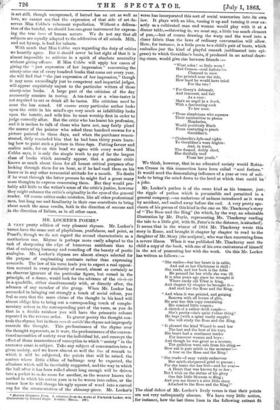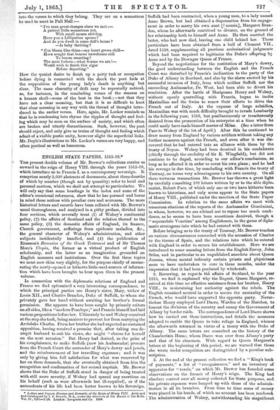MR. LOCKER'S POEMS.*
A VERY pretty edition of very pleasant rhymes. Mr. Locker's verses have the same sort of playfulness, punfulness, and point, as Praed's, though we do not regard the second characteristic as a meritorious one. Rhyme is perhaps more easily adapted to the task of sharpening the edge of humorous antithesis than to that of enhancing harmony and rounding off the beauty of poetic analogies. Mr. Locker's rhymes are almost always selected for the purpose of emphasizing contrasts rather than expressing concords. The law of his verse leads you to expect a real opposi- tion secreted in every similarity of sound, almost as certainly as an observer ignorant of the particular figure, but versed in the principle, of a dance, would look for the adv.:ince of the nit-is-vie in a quadrille, either simultaneously with, or directly after, the advance of any member of the group. When Mr. Locker has succeeded in bringing out strongly a touch of social colour, you feel as sure that the mere chime of the thought in his head will almost oblige him to bring out a corresponding touch of comple- mentary colour in the corresponding part of the verse, as you do that in a double rainbow you will have the prismatic colours repeated in the reverse order. In graver poetry the thought con- trols the rhyme, but in these vers de socilli the rhyme not improperly controls the thought. This predominance of the rhyme over the thought represents, as it were, the predominance of the conven- tional necessities of society over the individual lot, and conveys the effect of those mannerisms of conception to which " society" in the narrower sense is subject. Take any subject of conversation into a given society, and we know almost as well the line of remark to which it will be subjected, the points that will be raised, the centres where little eddies of badinage may be expected, the allusions which will be inevitably suggested, and the way in which the ball after it has been rolled about long enough will be driven into a pocket to mike room for another, as the weaver knows the method in which his cotton yarn is to be woven into calico, or the turner how he will change his ugly square of wood into a carved cup for the ornamentation of the chimney-piece. Mr. Locker's • Nome' Miniature Poets. A selection from the works of Frederick Locker, with Illustrations by Richard Doyle. London: Mouse. 1865.
verse has incorporated this sort of social mannerism into its own law. It plays with an idea, tossing it up and turning it over ex- actly as a cultivated man and woman would play with it at a dinner table,—throwing in, we must say, a little too much element of pun,—but of course drawing the warp and the woof into a closer fabric than the laws of ordinary conversation will allow. Here, for instance, is a little poem to a child's pair of boots, which embodies just the kind of playful remark (sublimated into epi- gram) to which Geraldine's boots, if produced in an actual draw- ing-room, would give rise between friends :—
"What soles ! so little worn !
Had Crusoe—soul forlorn !— Chanced to view
One printed near the tide'
How hard be would have tried For the two !
"For Gerry's debonair, And innocent, and fair As a rose : She's an angel in a frock, With a fascinating cock To her nose.
"Those simpletons who squeeze Their extremities to please Mandarins, Would positively flinch From venturing to pinch Geraldine's.
"Cinderella's lefts and rights To Geraldine's were frights : And, in truth,
The damsel, deftly shod, Has dutifully trod From her youth."
We think, however, that in no educated society would Robin- son Crusoe in this connection have been called "soul forlorn." It would need the demoralizing influence of a year or two of soli- tude to bring the mind down to the level at which that could be i a joke.
Mr. Locker's pathos is of the same kind as his humour, just) the ripple of pathos which is permissible and permitted in a general company, —an undertone of sadness introduced as it were by accident, and smiled away before the end. A very pretty spe- cimen of his poems of this kind is the one on Mr. Thackeray's story of "The Rose and the Ring" (to which, by the way, an admirable illustration by Mr. Doyle, representing Mr. Thxdreray reading the tale to a little girl, with St. Peter's in the distance, is attached). It seems that in the winter of 1851 Mr. Thackeray wrote this story in Rome, and brought it chapter by chapter to read to the daughter of Mr. Story (the sculptor), who was then recovering from
a severe illness. When it was published Mr. Thackeray sent the child a copy of the book, with one of his own caricatures of himself in the act of presenting her with the work. On this Mr. Locker has written as follows :—
"She smiles—but her heart is in sable, And sad as her Christmas is chill : She reads, and her book is the fable He penned for her while she was ill. It is nine years ago since he wrought it Where reedy old Tiber is king,
And chapter by chapter he brought it— And read her the Rose and the Ring.
"And when it was printed, and gait)ing Renown with all lovers of glee,
He sent her this copy containing His comical little eroquis ; A sketch of a rather droll couple—
She's pretty—he's quite Vother thing ! He begs (with a spine vastly supple) She will study the Rose and the Ring.
"It pleased the kind Wizard to send her The last and the best of his toys, His heart had a sentiment tender For innocent women and boys : And though he was great as a scorner,
The guileless were safe from his sting,—
How sad is past mirth to the mourner !— A tear on the Rose and the Ring !
"She reads—I may vainly endeavour Her mirth-chequered grief to pursue ;
For she hears she has lust—and for ever—
A Heart that was known by so few ; But I wish on the shrine of his glory One fair little blossom to fling ; And you see there's a nice little story Attached to the Rose and the Ring!"
The chief defect of Mr. Locker's lively verses is that their points are not very unfrequently obscure. We have very little notion, for instance, how the last three lines in the following extract fit into the verses to which they belong. They are on a seamstress he Used to meet in Pall Mall :—
" I've seen great changes since we met ;— A patient little seamstress yet,
With small means striving, Have you a Lilliputian spouse ?
And do you dwell in some doll's house ? —Is baby thriving?
"Cm bloom like thine—my heart grows chill— Have sought that bourne unwelcome still To bosom smarting?
The most forlorn—what worms we are !— Would wish to finish this cigar Before departing."
How the quaint desire to finish up a petty task or occupation before dying is connected with the shock the poet feels at the supposition of the young lady's death is anything but clear. The same obscurity of drift may be repeatedly noticed, as, for instance, in the concluding verses of the stanzas on a human skull—some of the best in the book ;—not that they have not a clear meaning, but that it is so difficult to knot that clear meaning in any way with the thread of thought intro- duced in the earlier verses. Here, again, Mr. Locker reminds us that he is condensing into rhyme the ripples of thought and feel- ing which may be seen on the surface of society, and which often
are broken and utterly discontinuous. Such, however, the poet should reject, and only give us trains of thought and feeling which admit of a visible poetic unity, however slight the superficial links.
Mr. Doyle's illustrations to Mr. Locker's verses are very happy, and often poetical as well as humorous.































 Previous page
Previous page